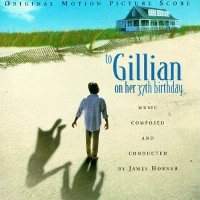- Composed by James Horner
- Epic Soundtrax / 1996 / 37m
Adapted from a play by Michael Brady, Michael Pressman’s To Gillian on Her 37th Birthday was a maudlin 1996 drama about a man whose grief for his wife, killed in a boating accident, was so absolute that he neglected his daughter. Spending much of his time on the beach near their summer house, the protagonist communicates with the spirit of his late wife, until her sister turns up and tries to set him up with a friend in order to get over himself. The savage reviews frequently questioned the whole premise – is it so wrong to grieve? Are the filmmakers seriously trying to get us to cheer along with the woman trying to get him to expunge his wife from his memory? It seemed ill-advised, to say the least.
This was James Horner’s third score of 1996 and shares something in common with the first of them, The Spitfire Grill, and perhaps with the much earlier weepy Dad. But unlike that first score, To Gillian doesn’t have a great range of colour – it is an earnest work and while I hesitate to call it “subtle” (Horner never leaves you in much doubt as to how you are meant to feel – which is, for the most part, sad) it is certainly amongst his least showy scores, performed by an orchestra that rarely rises above chamber proportions with keyboards and various soloists.
The score’s main theme – which is heard frequently over the course of the relatively short score, though it is joined by various others, all closely related harmonically – is introduced in the main title, “A Far Away Time”, in a horn solo with accompaniment from gentle pizzicato bass and synth before being taken up by the strings. At this point it is melancholic and wistful more than anything – calm and reflective but not sad, there’s even a slightly playful air to the B-section before the sunniest moment of the whole score comes in the cue’s second half, a warm and very attractive arrangement of the theme for strings.
Then tragedy strikes in the darkest moment, “The Boating Accident”; a tentative piano line over dreamlike synths, suddenly interrupted by a crashing piano in the lowest register – it’s a harrowing moment, further exposed as the earlier piano melody briefly rises from the ashes. After that, the score takes on a rather sentimental tone, not surprisingly, with “Gillian” a very gentle piano solo, moving slowly and gracefully, essentially a love remembered. It’s my favourite track on the album, beautifully moving thanks to its delicate prodding. (The score’s piano solos are actually played by Horner himself.)
“The Lighthouse” is a series of variations on a little melodic fragment, little wisps that feel like they’d blow away with the slightest breeze; then “Fond Hopes… Distant Memories” (a classic James Horner track title) really starts to push things, so full of tragedy and sadness it’s almost overpowering. “Rachel’s Dream / Gillian’s Vision” starts with a dramatic turn, a sudden clarity even as the pace remains slow, before another lovely piano rendition of the theme. A clever little sequence follows, the darker melody from “The Boating Accident” returning and gradually turning into a dazzling dance featuring the harp before a gorgeous romantic tune emerges from it. “The Decision to Leave Home” feels in many ways like the musical weight being lifted, an airiness taking hold as the score nears its conclusion.
There’s still time for one more cue and it’s a typically gargantuan Horner finale, the twelve and a half minute “Saying Goodbye” taking up a full third of the album’s running time. It opens with a gorgeous, warm performance of one of the secondary themes, revealed in this form as a kind of precursor to the Titanic love theme (written not long afterwards) before a lengthy exploration of the score’s main themes (one of which would come to be revisited in The New World). The last couple of minutes see the orchestra really swell for the only time in the whole score, providing a satisfying resolution. To Gillian is a quiet, thoughtful and beautiful score that doesn’t have the immediately striking features that grace much of Horner’s best work, but which rewards a deeper exploration.
Rating: ****
facebook.com/moviewave | twitter.com/MovieWaveDotNet | amazon.com













This is one of those albums I bought on a visit to London without having a clue what it would be like or what the film was about. I was a sucker for everything Horner did back then. I don’t think I’ve made ‘blind buys’ like I did back then for many years.
I rather preferred Horner’s sensitive, quieter scores compared to his louder action stuff. As I recall I enjoyed the album but I haven’t listened to it in years. Indeed, its somewhere in the house but if i tried to find it I’d likely be hours searching. Which I suppose means I feel its one of his lesser works, but who knows, after all these years it might be ripe for a fresh listen and will surprise me. Nice review. I do enjoy this series, and its certainly getting me thinking of all those Horner CDs I have hidden away. Time for a hunt….